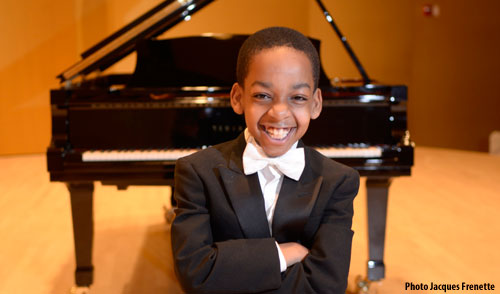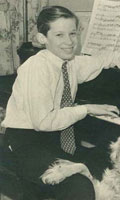Piano Prodigies of Yesterday and Today
February 1, 2014
Version française...
Flash version here.
In this feature, LSM presents a review of the first album by young pianist Daniel Clarke Bouchard, and a look some of history’s most notable piano prodigies. See our review of the first album by young pianist Karin Kei Nagano in our next issue.

Gifted Young Montreal Pianist Makes his First Recording
Scènes d’enfants
Music by Mozart, Schubert, Beethoven, Haydn, Schumann, Debussy and Léveillée
Daniel Clarke Bouchard, piano
With Oliver Jones, piano
ATMA Classique ACD2 2698 (52 m 17 s)
There have always been talented youngsters and there always will be. The fact is, however, that very few of them ever manage to translate that talent into careers. The successful ones are often those who have been properly nurtured by parents and teachers – and record companies. On the basis of this first recording, it appears that Daniel Clarke Bouchard and his supporters have a pretty good handle on nurturing.
It is already risky for a 13-year-old, eighth-grade student from St. Lambert to present himself to the world on a major commercial recording. It could be an important milestone in his career; it could also be widely-circulated evidence that he tried to do too much too soon.
But there are world-class nurturers at work here – presumably, his mother, his teachers and the folks at ATMA – and they got it right. This CD has been carefully planned and executed so as to show young Daniel at his best, playing repertoire that suits him at this stage of his life. “Scènes d’enfants” is the title of the album: Scenes from Childhood, after the Schumann piano work by the same name. Though all the pieces chosen are youthful in spirit, it does not mean they are intended to be played by students. On the contrary, some of them are very difficult indeed. Daniel understands this music, and he is more than equal to every technical challenge.
Daniel and his wise nurturers have something else going for them too. At an early age the great Montreal jazz pianist Oliver Jones took an interest in the unusually gifted young man and became one of his mentors. It was a brilliant idea to have the 79-year-old Jones collaborate with Daniel on this CD, and in just the right way. Daniel seems to have no special ambition to become a jazz pianist himself, and he doesn’t play any jazz on this album. Nor does Jones crossover and play any classical music. They meet in the middle, you might say.
For example, in the first track of the CD while Daniel plays Mozart’s Variations on “Ah! Vous dirai-je, maman”, Jones seated at a second piano adds some jazz ornamentation from time to time. The result is fresh and delightful. And in the last track they are at it again. This time they put Claude Léveillée’s La Grande valse fofolle through its paces and it is a wonderful tour de force.
Elsewhere Daniel shows himself to be a surprisingly mature interpreter of Mozart and Haydn. Mendelssohn’s Rondo capriccioso Op. 14 could be a little lighter on its feet but the technical issues are well under control.
All in all, this is a splendid debut album that can be enjoyed for itself but also as a harbinger of great things to come.
Paul E. Robinson
Piano Prodigies Throughout History by Rebecca Anne Clark
|
 |
G. F. Handel’s father was scornful of his son’s precocious musical talent — he wanted him to be a lawyer. According to John Mainwaring, Handel’s first biographer,
“Handel had discovered such a strong propensity to Music, that his father who always intended him for the study of the Civil Law, had reason to be alarmed. He strictly forbade him to meddle with any musical instrument but Handel found means to get a little clavichord privately convey’d to a room at the top of the house. To this room he constantly stole when the family was asleep.”
Handel’s father finally relented and allowed his son to study music after the prodigy surprised everyone with a skilled organ performance at the age of seven. |
 |
W. A. Mozart began watching his older sister, Maria Anna “Nannerl” Mozart, study the keyboard with their father Leopold at the age of three. By four, Leopold was teaching him minuets at the clavier, which the little boy could play perfectly, and by five he was composing little pieces for his father who would write them down. Mozart composed his first minuet at the age of six, his first opera at 11, and his first complete symphony at 8. Between the ages of 8 and 19, he composed 33 symphonies. |
 |
Ludwig von Beethoven’s father Johann admired the success that Leopold Mozart had enjoyed with his two prodigious children, and pushed young Ludwig to achieve the same fame, sometimes lying about his age to make him seem younger. Beethoven gave his first concert at age seven, and by age ten, he was working as an assistant organist at court in Bonn alongside his teacher, Christian-Gottlob Neefe. He published his first sonatas at age 12. |
| |
Camille Saint-Saëns displayed perfect pitch at the tender age of two, when his great-aunt began teaching him piano. The child was composing by age six and gave his debut recital at age ten, where as an encore, he offered to play any of Beethoven’s 32 sonatas from memory. He composed his first symphony at age 16. Saint-Saëns’ genius was not limited to music: he could read and write by age three, dabbled in science and mathematics, and wrote plays, poems, and essays in addition to composing music. |
 |
Frédéric Chopin didn’t begin studying music formally until the age of six, but by age seven he had composed two polonaises and was giving charity concerts, much to the delight of Polish audiences. When after one concert, he was asked what he thought the audience liked best about his performance, the charming youngster replied, “My shirt collar.” |
| |
A young Sergei Prokofiev was inspired by listening to his mother play Chopin and Beethoven in the evenings, and at age five, he composed an “Indian Gallop” which his mother transcribed. He was composing his first opera, The Giant, by age nine, and attempted his first symphony at age 11. |
 |
Glenn Gould’s mother was determined that he would be a musician before he was even born! Luckily, young Gould’s talents matched his parents’ expectations — he had perfect pitch at age three and could read music before he could read words. He began playing the piano for friends and family and at age six, performed his own composition at the local church. He began his studies at Toronto’s Royal Conservatory at age ten but his parents were nevertheless protective of him; Gould was thirteen when he made his debut at a Casavant Society concert in 1945. |
Version française... | |

